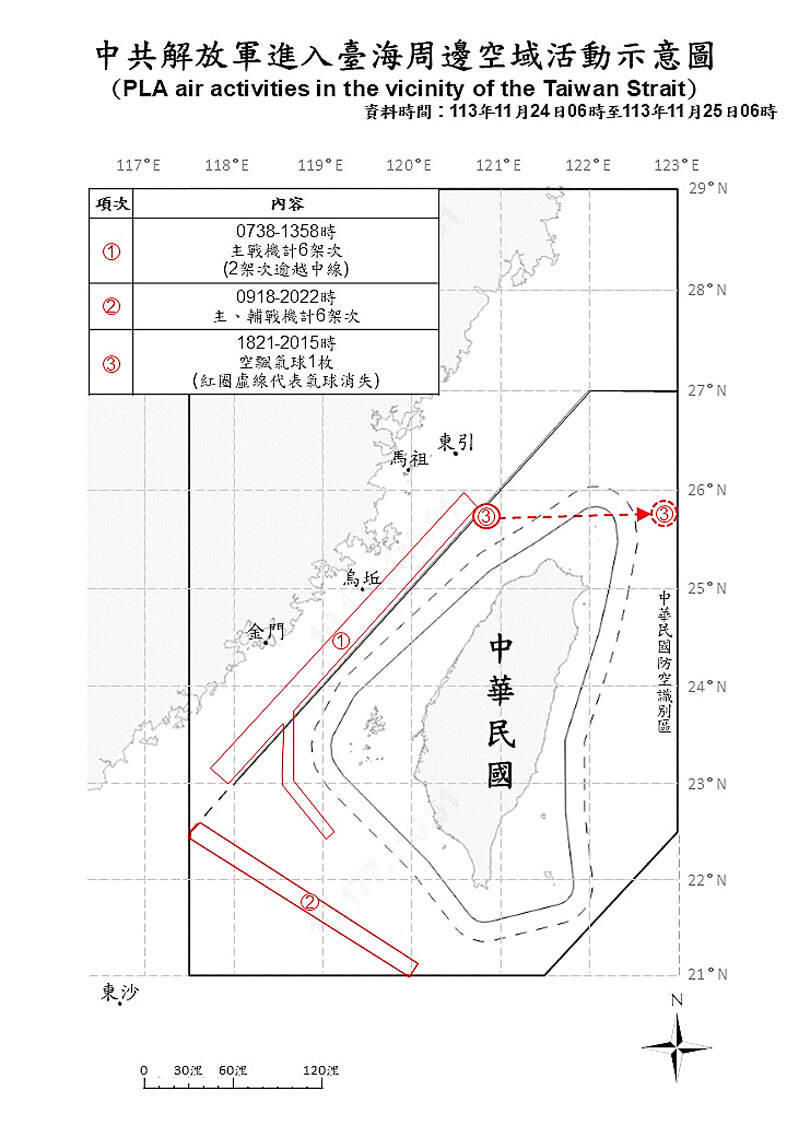The US is drawing up contingency plans for military deployments in Japan and the Philippines in case of a Taiwan emergency, Japan’s Kyodo news agency reported.
They would be incorporated in a first joint operation plan to be formulated in December, Kyodo reported late on Sunday, citing sources familiar with Japan-US relations.
A US Marine Corps regiment that possesses High Mobility Artillery Rocket Systems — a light multiple rocket launcher — would be deployed along the Nansei Island chain stretching from Kyushu to Yonaguni near Taiwan, Kyodo said.

Photo courtesy of the Ministry of National Defense
According to US military guidelines for dispatching marines in small formations to several locations, if a Taiwan contingency becomes imminent, temporary bases would be set up on inhabited islands, the report added.
Japan’s military is expected to mainly provide logistical support for the US marine unit, including supplying fuel and ammunition, it said.
The US Army would also deploy Multi-Domain Task Force long-range fire units in the Philippines, Kyodo said.
The defense ministries of Japan and the Philippines were not immediately available for comment. The US embassy in Manila declined to comment.
Asked about the report yesterday, the Chinese Ministry of Foreign Affairs said that Taiwan is an “inalienable part of China’s territory.”
“China firmly opposes relevant countries using the Taiwan issue as an excuse to strengthen regional military deployment, provoke tension and confrontation, and damage regional peace and stability,” Chinese Ministry of Foreign Affairs spokeswoman Mao Ning (毛寧) said.
China is building up its military capacity while ramping up pressure on Taiwan. Meanwhile, Washington has been strengthening alliances in the region and infuriating Beijing with regular deployments of ships and fighter jets in the Taiwan Strait and the South China Sea.
In other developments, Taiwan yesterday said it had detected a Chinese balloon over waters northwest of the nation, the first such sighting since April.
China regularly deploys fighter jets, drones and warships around Taiwan, and occasionally balloons, as it keeps up military pressure. The latest balloon was spotted at 6:21pm on Sunday, about 111km northwest of Keelung at an altitude of 10,058m, the Ministry of National Defense said.
It entered Taiwan’s air defense identification zone and disappeared at 8:15pm, the ministry said.
Twelve Chinese military aircraft and seven warships were also detected around the nation in the 24 hours to 6am yesterday, it added.
The ministry releases daily data on China’s military presence around Taiwan.
In the run-up to the January presidential election, balloons crossed the sensitive waters separating Taiwan and China day and night, with some floating above the nation. Taipei has described the balloons as a form of “gray zone” harassment — a tactic that falls short of an act of war.
China has previously brushed off allegations that it sends balloons over Taiwan, accusing Taipei of trying to raise tensions.
Asked about the balloon yesterday, Mao told reporters: “First of all, Taiwan does not have a ‘defense ministry.’ Furthermore, the question you asked is not a diplomatic one.”
Balloons from China became a politically fraught topic early last year when the US shot down what it called a spy balloon. The huge balloon, which carried a large payload of electronics, flew over sensitive US military installations and prompted concerns Beijing was scooping up vital intelligence.
Beijing has said it was a civilian airship blown off-course.

Taiwan is stepping up plans to create self-sufficient supply chains for combat drones and increase foreign orders from the US to counter China’s numerical superiority, a defense official said on Saturday. Commenting on condition of anonymity, the official said the nation’s armed forces are in agreement with US Admiral Samuel Paparo’s assessment that Taiwan’s military must be prepared to turn the nation’s waters into a “hellscape” for the Chinese People’s Liberation Army (PLA). Paparo, the commander of the US Indo-Pacific Command, reiterated the concept during a Congressional hearing in Washington on Wednesday. He first coined the term in a security conference last

Prosecutors today declined to say who was questioned regarding alleged forgery on petitions to recall Democratic Progressive Party (DPP) legislators, after Chinese-language media earlier reported that members of the Chinese Nationalist Party (KMT) Youth League were brought in for questioning. The Ministry of Justice Investigation Bureau confirmed that two people had been questioned, but did not disclose any further information about the ongoing investigation. KMT Youth League members Lee Hsiao-liang (李孝亮) and Liu Szu-yin (劉思吟) — who are leading the effort to recall DPP caucus chief executive Rosalia Wu (吳思瑤) and Legislator Wu Pei-yi (吳沛憶) — both posted on Facebook saying: “I

Sung Chien-liang (宋建樑), who led efforts to recall Democratic Progressive Party (DPP) Legislator Lee Kun-cheng (李坤城), was released on bail of NT$80,000 today amid outcry over his decision to wear a Nazi armband to questioning the night before. Sung arrived at the New Taipei District Prosecutors’ Office for questioning in a recall petition forgery case last night wearing a red armband bearing a swastika, carrying a copy of Adolf Hitler’s Mein Kampf and giving a Nazi salute. Sung left the building at 1:15am without the armband and covering the book with his coat. Lee said today that this is a serious

The Ministry of Economic Affairs has fined Taobao NT$1.2 million (US$36,912) for advertisements that exceed its approved business scope, requiring the Chinese e-commerce platform to make corrections in the first half of this year or its license may be revoked. Lawmakers have called for stricter enforcement of Chinese e-commerce platforms and measures to prevent China from laundering its goods through Taiwan in response to US President Donald Trump’s heavy tariffs on China. The Legislative Yuan’s Finance Committee met today to discuss policies to prevent China from dumping goods in Taiwan, inviting government agencies to report. Democratic Progressive Party Legislator Kuo Kuo-wen (郭國文) said